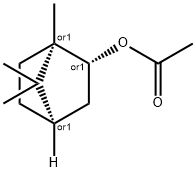A5006812
Isobornyl acetate , >94.0%(GC) , 125-12-2
Synonym(s):
Acetic acid isobornyl ester, exo-(1R)-1,7,7-Trimethylbicyclo[2.2.1]hept-2-yl acetate;Isobornyl acetate
CAS NO.:125-12-2
Empirical Formula: C12H20O2
Molecular Weight: 196.29
MDL number: MFCD00135943
EINECS: 204-727-6
| Pack Size | Price | Stock | Quantity |
| 100ML | RMB31.20 | In Stock |
|
| 500ML | RMB70.40 | In Stock |
|
| others | Enquire |
Update time: 2022-07-08
PRODUCT Properties
| Melting point: | 29°C |
| Boiling point: | 229-233 °C (lit.) |
| Density | 0.983 g/mL at 25 °C (lit.) |
| vapor pressure | 0.13 hPa (20 °C) |
| FEMA | 2160 | ISOBORNYL ACETATE |
| refractive index | n |
| Flash point: | 190 °F |
| storage temp. | Store below +30°C. |
| solubility | 0.16g/l |
| form | Oil |
| color | Colourless |
| Specific Gravity | 0.98 |
| Odor | at 100.00 %. balsam camphor herbal woody sweet |
| Odor Type | balsamic |
| optical activity | [α]/D -2.0 to 2.0, neat |
| biological source | synthetic |
| Water Solubility | Not miscible or difficult to mix with water. |
| JECFA Number | 1388 |
| BRN | 3197572 |
| Stability: | Stable. Flammable. Incompatible with strong oxidizing agents. |
| InChIKey | XWIGWPJZNFZLBG-UHFFFAOYSA-N |
| LogP | 3.86 |
| CAS DataBase Reference | 125-12-2(CAS DataBase Reference) |
| NIST Chemistry Reference | Isobornyl acetate(125-12-2) |
| EPA Substance Registry System | Isobornyl acetate (125-12-2) |
Description and Uses
Isobornyl acetate is one of the most important chemicals used in the perfumery industry. It is used in toiletries and soaps as a flavoring agent and antiseptics. One of main applications is as an intermediate to produce camphor.
Safety
| Symbol(GHS) |  GHS07 |
| Signal word | Warning |
| Hazard statements | H315 |
| Precautionary statements | P264-P280-P302+P352-P332+P313-P362+P364 |
| Hazard Codes | Xi |
| Risk Statements | 36/37/38-38 |
| Safety Statements | 26-36/37/39-24/25 |
| WGK Germany | 1 |
| RTECS | NP7350000 |
| Autoignition Temperature | 440 °C DIN 51794 |
| TSCA | Yes |
| HS Code | 29153900 |
| Hazardous Substances Data | 125-12-2(Hazardous Substances Data) |
| Toxicity | LD50 orally in Rabbit: > 10000 mg/kg LD50 dermal Rabbit > 20000 mg/kg |


